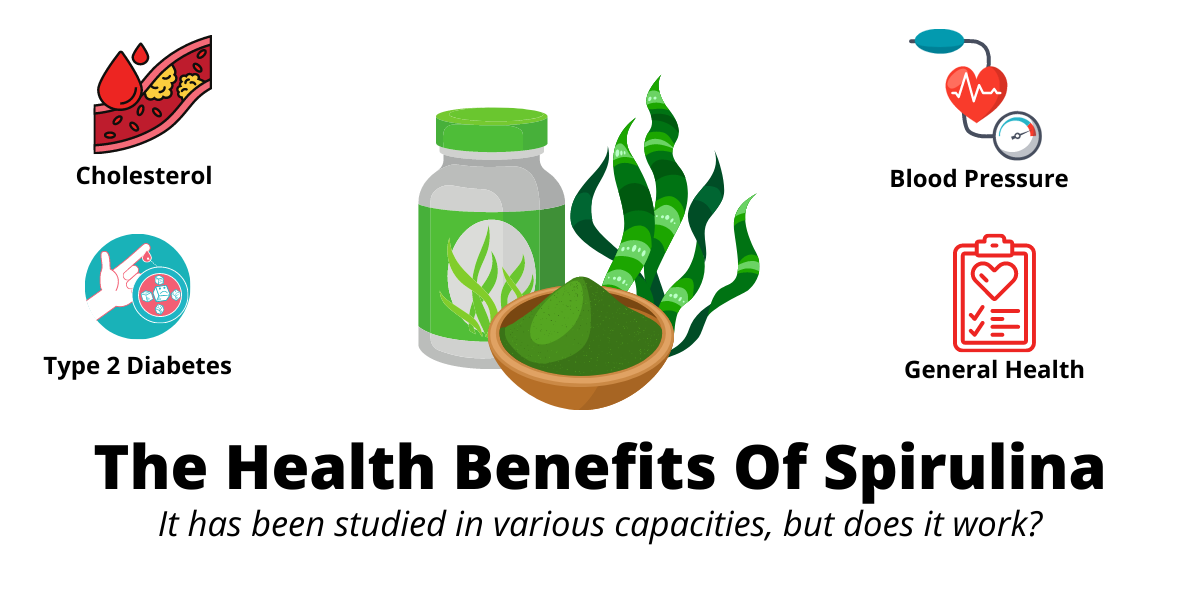Today’s article is a special request of sorts from one of my long-time clients who was curious about my thoughts the blue-green algae Spirulina which is often consumed by humans and animals and cultivated across the globe for this purpose.
In order to adequately respond to my client’s query, I knew some research would be required and given that I’ve heard Spirulina come up as a popular topic in the past, I thought to turn my response into a proper blog post.
What Is Spirulina?
Often referred to as “blue-green algae” Spirulina is technically a type of bacteria known as cyanobacteria owing to its, you guessed it, blue-green pigmentation.
It’s nutrient dense and has been utilized for this purpose historically in different parts of the world, gaining some traction as a supplement over the last few decades.
Spirulina contains essential fatty and amino acids as well as various vitamins/minerals but an impressive anti-oxidant capacity is considered one of its most salient characteristics.
The question we ask today is whether or not it represents a supplement that offers enough proven benefit that it is worthy of your, or anyone else’s, consideration.
Let’s find out.
The Health Benefits Of Spirulina
In order to speak meaningfully about the health benefits of any given supplement it’s important to assess the state of the evidence, specifically studies in humans.
Here are some health contexts that spirulina supplementation has been explored for.
Blood Pressure
A 2021 systematic review and meta-analysis out of the Nutrients journal found that spirulina supplementation ranging from 1 to 8 grams per day over a 2-12 week period had the potential to lower systolic and diastolic blood pressure by around ~4-7 mmHg each in some people with hypertension or high blood pressure.
The significant ranges in dosage and duration speak to the lack of uniformity of available studies to assess, which also explains why spirulina supplementation is not yet a widely supported or recommended supplement for those with high blood pressure.
Cholesterol & Triglycerides
A 2015 systematic review and meta-analysis out of the Clinical Nutrition (Scotland) journal found that spirulina supplementation may reduce unhelpful LDL and triglyceride levels while boosting healthy HDL levels.
The quality and number of studies used for this analysis was lacking but the finding is an intriguing one if for no other reason than cholesterol lowering medications are among the most frequently prescribed in Canada.
Yet given how safe and well-studied dietary intervention for cholesterol is (See Portfolio Diet) it’s hard to make strong claims about spirulina’s utility for this purpose.
Type 2 Diabetes
A 2021 systematic review and meta-analysis out of the Journal of Diabetes and Metabolic Disorders looking at spirulina supplementation in individuals living with type 2 diabetes found some potential for it to reduce fasting blood sugar but not A1C levels.
Spirulina supplementation is not mentioned or recommended by Diabetes Canada’s Clinical Practice Guidelines and lacks the same body and rigour of evidence that other blood sugar lowering supplements like psyllium ( and other soluble fibres) do.
I will also make note of a 2008 experimental study out of Korea which found that individuals living with type 2 diabetes who had the highest starting cholesterol ( a common co-morbidity) levels received the most beneficial effects from spirulina supplementation ( 8 grams daily over a 12 week period).
General Health
Spirulina is one of a significant number of potential dietary/supplemental sources of potent antioxidants and as such as generated interest as a complimentary management strategy for the conditions mentioned above, among others.
These include reducing markers of inflammation and oxidative stress, enhanced immunity, exercise recovery and more.
Spirulina has been studied sparsely in humans with dosages and durations varying from 1-12 months and .5-20 grams per day, making it very hard to draw meaningful conclusions about the advantages of spirulina use vs dietary enhancement and supplementation using better studied compounds.
If you feel compelled to learn more about spirulina use in these various capacities, this 2018 Journal Of Applied Physiology article would be a good starting point.
Final Thoughts, Disclaimer & Safety Considerations
Today’s article is not intended as an endorsement or dismissal of spirulina, which clearly has some components of nutritional value.
The question as to whether or not these components justify its inclusion into YOUR routine is much harder to answer given that the roles it might fulfil could theoretically be addressed through better studied and more reliable measures.
Although most literature seems it to be a safe supplement to use at recommended dosages, there are a number of considerations which must be kept in mind including quality/reliability of any given supplement, potential drug interactions and other safety concerns for certain demographics of people.
If you are considering spirulina supplementation I recommend, at a minimum, reviewing this Medline resource which helps to clarify some of the potential areas of consideration to ensure its safe use.
I’d also like to make a friendly reminder that if you are living or dealing with any of the conditions mentioned in today’s post, your best and most effective path forward will almost inevitably rely on dietary modifications/improvements – and guess what, that’s my specialty.
So don’t hesitate to reach out.
Until next time,
Andy De Santis RD MPH



